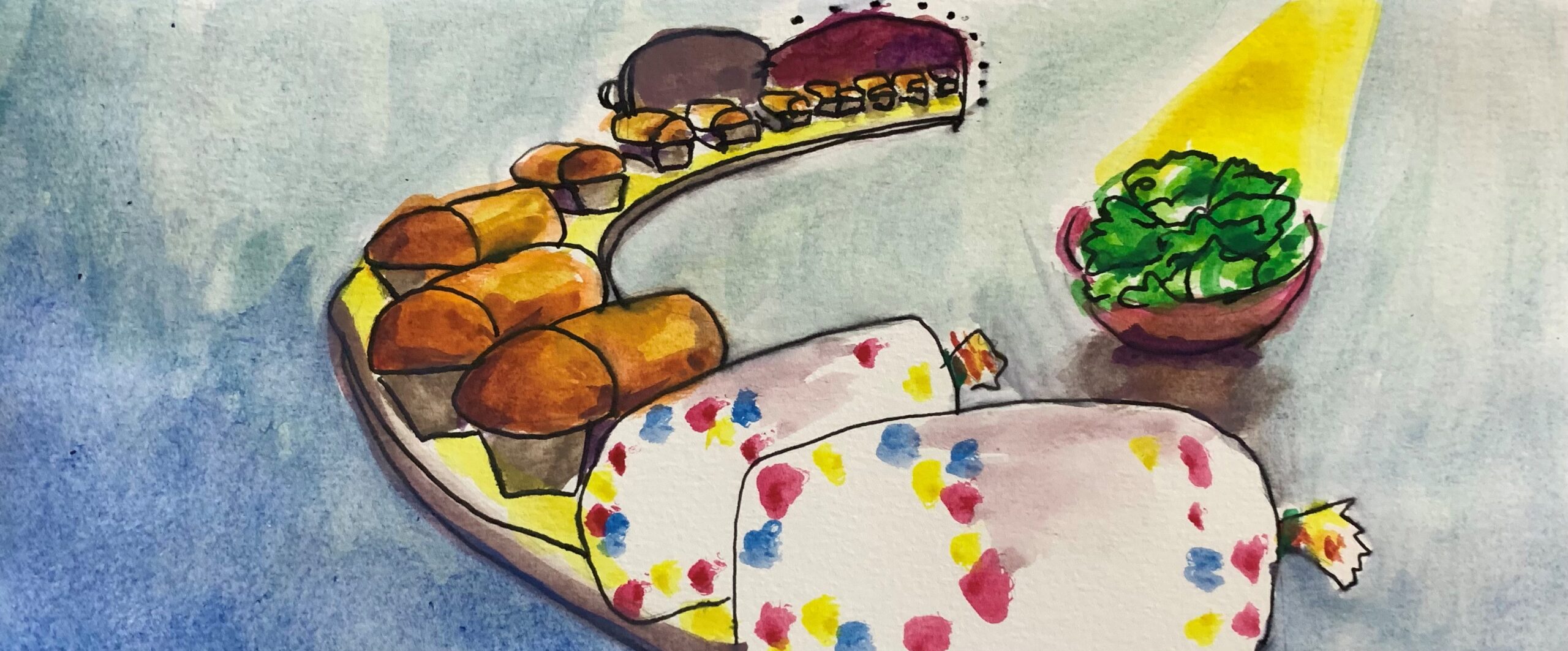Kendall Dinniene (she/hers) is a Ph.D. student studying American Literature and Fat Studies at Southern Methodist University in Dallas, Texas.
An Instagram account with over one million followers posted a shaky video of an oceanside proposal. It features a soon-to-be engaged couple and a friend tasked with recording this special moment. As the future groom pulls a ring box from his cargo shorts, his partner raises her hands over a wide smile, and their friend moves around the pair for a better angle. Eyes locked on her recording device, she trips on a large rock and tumbles into the sand. She continues filming, struggling to regain her footing. Bracing herself on another rock, she pushes off with a little too much momentum and falls again just as the would-be groom kneels to pop the question.
Shortly after being posted, the video had nearly one thousand comments. Some sympathize with the fallen woman: “Me. I’m that friend.”
Most, however, do not see themselves in the friend for a single reason: she’s fat.
These commenters compare the woman to a cow and to a whale. They call her useless. One suggests that someone should “Shoot [the fat woman] right there.” Others speculate about the diet responsible for such a body. One user posits, “Results of too much McDonald’s, Denny’s, and Taco Bell.” Another commenter provides the pithy, “A few doughnuts too many.” Most jarringly, one writes, “Eat a salad, sweetie. We all have to once in a while.”
All of these reactions to the video reflect a misguided insistence that fat people are fat because of what they eat and that such comments are helpful, even as (or, perhaps, because) they hurt.
For over twenty-five years, medical and governmental authorities in the United States have worked in tandem to conjure an “obesity” panic and to demonize the nation’s diet. (I use quotation marks when referring to “obesity” throughout this article to reflect the word’s contested use.) With the 1995 launch of former Surgeon General C. Everett Koop’s Shape Up America! (funded by Jenny Craig, Weight Watchers, and Slim Fast), the nation declared war on fat bodies and on the dietary decisions that purportedly produce them. Koop had previously taken on big tobacco and is regretfully only remembered by many as a real crusader for the people in the face of big business.
Three years later, the National Institutes of Health (NIH) lowered BMI thresholds for “overweight” and for “obesity,” making millions of Americans fat overnight and increasing national pressure to lose weight.
In 2001, another Surgeon General formalized this pressure with the official Call to Action to Prevent and Decrease Overweight and Obesity. Particularly concerned with eating habits (by word count, the report refers to “food,” “diet,” and “nutrition” 158 times total, while “exercise” and “activity” get only 107 mentions), the Call frames fat people’s food choices as civic, medical, and moral matters, matters threatening the nation’s future through lost productivity, through increased healthcare costs, and through increased rates of disability and death. Relying on “obesity” experts, the report urges people to combat the harms of excess weight by preparing and eating low calorie, low-fat foods in small portions. Eat differently, American authorities contend, and you’ll live and look differently.
In 2013, the American Medical Association (against the advice of its own researchers) designated “obesity” a disease. Fat activists spoke against the decision to pathologize their bodies, arguing that the word “obesity” itself is an anti-fat slur. While the American Medical Association states that its decision benefits fat people by extending insurance coverage for weight loss treatments and easing stigma, data shows that those treatments are ineffective and that both implicit and explicit anti-fatness are increasing. If “obesity” is a disease, it’s an incurable one that the American public overwhelmingly blames on its victims.
Anti-fat rhetorics frame fatness as a social ill easily combated through changes in individual diet, but the truth is sustained weight loss is impossible. At least, that’s the case for 95-98 percent of dieters, who attempt and fail to maintain weight loss over a 2-5 year period. Indeed, the last thirty years of panicked and painful dieting have only made us fatter. Yet medical and governmental authorities continue to pitch diets, telling the world that fat people are responsible for and capable of changing their bodies— why?
The answer is simple: profit.
Weight loss clinics, pharmaceutical giants, and diet plan companies (such as WW, formerly Weight Watchers) and the physicians and “obesity” researchers who run them, endlessly sell the notion that thinner bodies are healthier than fat ones, while almost never actually delivering weight loss—or improved health.
In fact, weight loss attempts often make fat people less healthy. Nutrisystem’s prepackaged diet meals caused severe gallbladder damage. WW continues to target children and teens, despite knowing that dieting among youth causes higher rates of eating disorders, as well as greater adulthood weight.
One part of the deadly drug combination Fenfluramine/Phentermine (Fen-Phen), is still being marketed as an appetite suppressant. Related to amphetamines, the drug has been linked to lethal cardiovascular and pulmonary damage. It also doesn’t work. Like dieting, after initially experiencing some weight loss, most takers of diet pills regain all they had lost and more. Yet, despite its overwhelming and decades-long failure, the weight loss industry in the United States continues to enjoy tremendous profits, raking in $71 billion in 2020 alone. Global profits are predicted to climb to more than $442 billion in 2025. Weight loss industry profits don’t reflect weight loss, but they do show that the war on fat is growing stronger—and more dangerous. And the “obesity epidemic” panic has been called the U.S.’s greatest export by some.
Fat doesn’t necessarily make people sick, but fat stigma and discrimination, which is enabled by and maintained by the weight loss industry, does.
A groundbreaking and largely ignored 2013 study found that “overweight” and mildly “obese” people live longer than those with “normal” BMIs. Further evidence demonstrates that health issues commonly associated with weight are actually the result of entrenched anti-fat sentiment and the drastic measures it provokes. Repeated weight loss and regain (called weight cycling or “yo-yoing”) is linked to cardiovascular disease, to diabetes, and to disordered eating that causes weight gain.
Widespread perception of weight stigma also hurts people’s health. People who feel stigmatized due to their weight are more likely to be depressed, to binge eat, and to experience high blood pressure and elevated cortisol levels. Fat discrimination (legal almost everywhere in the U.S.) also impacts fat people’s income and access to competent, compassionate medical care. While merely being fat is not deadly, fat hatred and fat stigma harm in myriad ways.
In 2012, 28-year-old Rebecca Hiles had emergency surgery to remove her cancerous and rotting left lung. The young woman had been having symptoms of serious disease, such as shortness of breath and coughing up blood, for over a decade, but in that time physicians never considered that the culprit might not be her weight. They repeatedly told Hiles her problems would be solved if she could only slim down.
Hiles isn’t alone in her experience with medical anti-fat bias. In 2018, a fat Canadian woman and cancer patient spoke out about the poor treatment she endured from medical doctors in the only way left to her — her obituary.
If the goal is a healthier population, we must admit that dieting won’t get us there. Neither will the harmful fat shaming so many (including commenters on the internet) gleefully engage in. It’s time to accept that fat bodies are here to stay, and to remember that while the diet industry may make some people very rich, it’s costing the rest of us much more than money.
This piece is indebted to work by the following: Natalie Boero, Paul Campos, Paul Ernsberger, Aubrey Gordon, Pat Lyons, and Marilynn Wann.
Kendall Dinniene (she/hers) is a Ph.D. student studying American Literature and Fat Studies at Southern Methodist University in Dallas, Texas.
Art by Michelle Huang. Michelle read this piece and designed an original painting for Conceptions Review. It is inspired by a vintage Wonderbread ad. Michelle is an artist from Sugar Land, Texas, now based out of New York, New York. She specializes in oil painting, known for her expressionist style in both figurative and abstract work. Her website is https://mhuangart.com.
Launched in March 2021, Conceptions Review is interested in the ideas people have about society and the consequences of these ideas. We seek accessible and standalone articles about conception-bending ideas and popular misconceptions. We are open to fields ranging from musicology to history to mathematics to insectology and everything in between.


